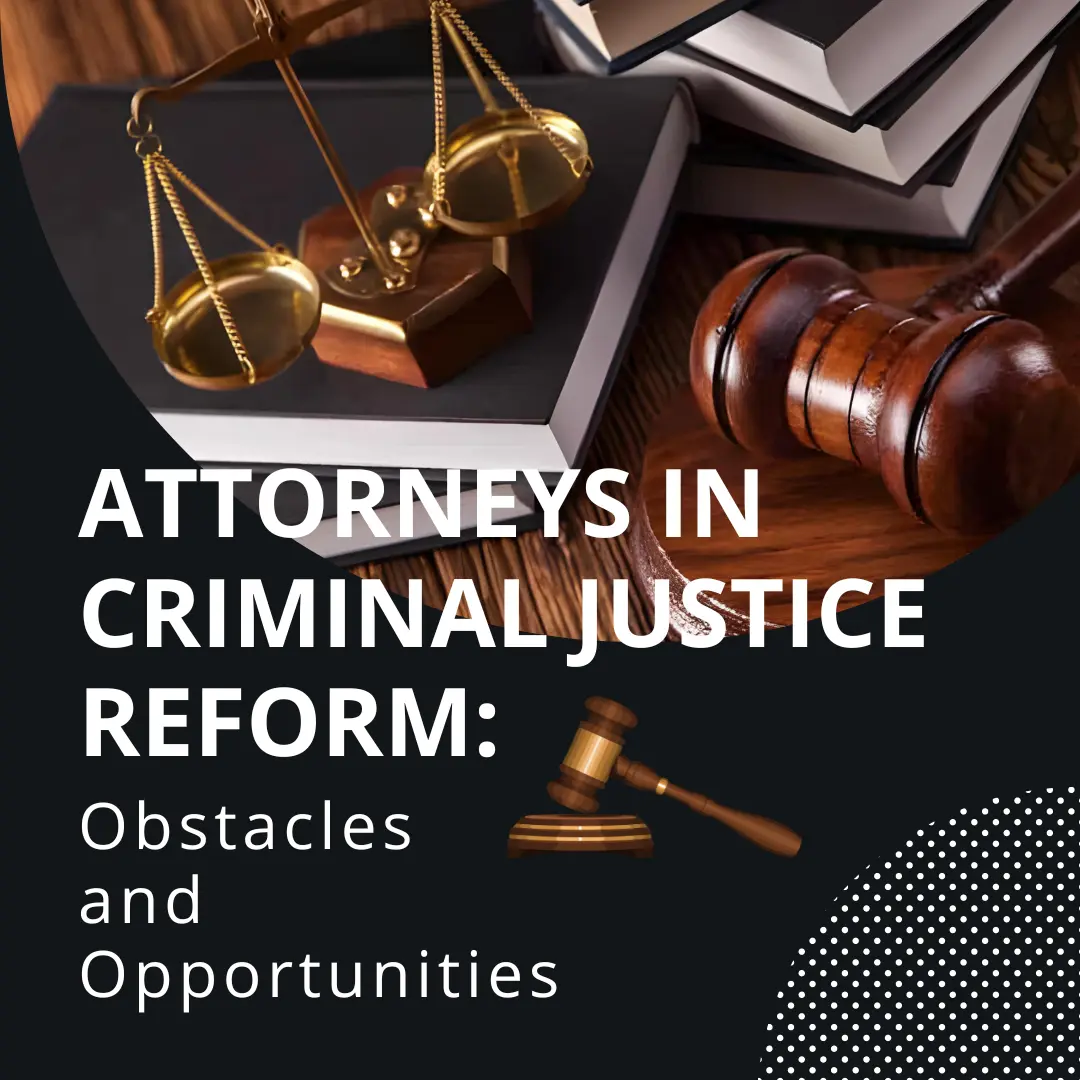Introduction
Attorneys are vital and difficult in criminal justice reform. As the major legal agents, solicitors influence many elements of life and community health. The essay covers attorneys’ criminal justice reform problems and potential contributions. A detailed review will examine structural issues, ethical issues, and how solicitors may improve the court system.
Attorney for Criminal Justice The role of justice defenders
Attorneys safeguard the law and ensure fairness in the courts. They must balance government power and individual rights as public defenders, prosecutors, or private defense attorneys. They ensure fair and just judicial proceedings by upholding justice at the center of the legal system.
Law Process Gatekeepers
Attorneys must ensure judicial fairness and justice as gatekeepers. It entails representing clients, providing facts, and combatting crime. Their decisions can profoundly impact criminal procedures and the accused’s and relatives’ lives. Attorneys must navigate complicated legal systems to guarantee justice is done and perceived.
A changemaker
Attorneys can impact criminal justice. They can combat unjust laws, promote legal changes, and improve criminal justice through litigation, advocacy, and policy. They can identify systemic issues and provide solutions owing to their knowledge and strategic positioning. Attorneys’ skills and platforms can advance justice and equality.
Criminal Justice Reform Obstacles
Building Obstacles Institutional Habits
Legal institutions’ established practices impede justice reform. Many of these habits are hard to change due to tradition, bureaucratic inertia, and important stakeholders. Established frameworks limit solicitors’ flexibility. Organizational inertia makes change difficult.
Overburdened Public Defence
Many countries have overworked and underfunded public defense systems, resulting in heavy caseloads and insufficient resources for defenders. This affects solicitors’ representation and improving efforts. Workloads often hinder public defenders from preparing cases and providing personalized treatment. Lack of resources and support can burnout and slow systemic change. Addressing structural issues in the public defense system is vital for competent and passionate representation of all income levels.
Ethics issues
Passionate Advocacy and Ethics
Attorneys must reconcile ethics and client advocacy. Solicitors may struggle to balance client obligations with institutional change in justice reform. Attorneys must weigh the legal consequences of their actions while vigorously defending clients.
Privacy and Disclosure
Ethics of secrecy can hamper legal transparency and accountability. Attorneys may have crucial systemic knowledge but cannot communicate it due to client confidentiality and legal limitations. Systemic inequalities must be addressed while protecting client privacy and promoting transparency. Attorneys must weigh justice and public interest while making ethical choices. Challenges In politics and society, opposition exists.
Police, legislators, and some individuals oppose criminal justice reform. Reform lawyers must navigate this politically charged environment where changes may be resisted. Strategizing, coalition-building, and effective communication are essential to overcome political hurdles and win public support for reform.
Media and public opinion influence
Media and public opinion influence criminal justice reform. Negative attorney representations and sensationalized media coverage of criminal cases may undermine fair and informed reform conversations. Attorneys must refute fallacies and highlight systemic injustices’ human cost through media, public education, and activism. Attorneys may promote criminal justice reform by influencing stories and language.
Impact Chances
Strategy Use litigation to challenge unjust laws.
Strategic litigation allows attorneys to battle systematic inequality-causing laws and practices. Attorneys can set precedents for wider reforms by suing for constitutional violations and discrimination. Lawyers can utilize judicial power to overthrow unjust laws and achieve justice utilizing targeted legal approaches and innovative arguments.
Class action lawsuit
Class action lawsuits help attorneys confront criminal justice systemic issues. These lawsuits can reveal structural inequalities and drive companies to change to avoid liability. By defending victims, solicitors may exacerbate systemic injustices and hold institutions accountable. Class actions can bring about big reforms and justice for everybody.
Policy, Advocacy
Law Advocacy
Attorneys may aid legislative advocacy by writing legislation, providing expert testimony, and working with politicians to pass reforms. Their legal and justice expertise makes them good policymakers. Attorneys can write laws that address systemic issues, improve fairness, and safeguard criminal justice system participants. Strategic advocacy by solicitors can improve justice and safety.
Local organising
Through grassroots involvement and legislative advocacy, attorneys may promote criminal justice reform. Attorneys can raise awareness and motivate action through community groups, public forums, and media campaigns. Community mobilization is needed to advance reform and hear from justice victims. Solicitors can use their networks to promote criminal justice equality, fairness, and accountability for vulnerable groups.
Education and Training Legal Education Reform
Social justice and public interest law training prepares attorneys to change criminal justice. Systemic racism, mass incarceration, and restorative justice may be taught at law schools to prepare students for reform positions Including these themes in law schools may help students recognize injustice and become legal change agents. Students get real-world reform experience and systemic change advocacy skills in clinics and internships.
Continuing Legal Education (CLE) courses on criminal justice reform can help attorneys. These courses can provide solicitors with legal updates, advocacy advice, and networking opportunities with reform-minded professionals. Attending CLE courses may help attorneys learn about criminal justice reform, increase their legal expertise, and become change agents. Attorneys can work on legal structural disparities and exchange innovative solutions during CLE sessions.
Pro Bono and Volunteering Enhance Justice Access
Pro bono and volunteer attorneys assist marginalized and poor populations get justice. Free legal assistance for low-income clients reduces criminal justice inequities. Legal aid and social justice are promoted via pro bono work. Time and knowledge from solicitors can benefit those without legal representation.
Reform Supporter
By volunteering for criminal justice reform groups, solicitors may encourage change. Investigations, legal document writing, and impact lawsuit representation. Legal professionals may assist systemic changes that address root causes of injustice and criminal justice accountability by engaging with advocacy groups. Pro bono work with reform-minded groups helps solicitors make sustainable change.
Criminal Justice Reform Attorney Case Studies
Gideon’s Promise
By helping public defenders, Gideon’s Promise attempts to transform criminal justice. Attorney Jonathan Rapping formed the group to educate, advise, and represent US public defenders. Gideon’s Promise promotes justice and change among public defenders.
The Innocence Project
Barry Scheck and Peter Neufeld founded the Innocence Project to exonerate wrongfully convicted persons using DNA and other methods. This agency has liberated many innocent persons and highlighted institutional faults including prosecutorial misconduct, incompetent defense, and forensic science errors.
The Sentencing Project
The Sentencing Project promotes fairness and incarceration reduction. Through research, policy analysis, and public education, the organization’s attorneys and advocates fight racial inequality, mass incarceration, and poverty criminalization.
Strategies for Overcoming Obstacles
An interdisciplinary approach
Criminal justice reform can be improved by coalitions comprising social workers, psychologists, and community activists. Multidisciplinary approaches tackle complex, interconnected systemic issues. Combining information and perspectives, multidisciplinary teams can solve legal, social, economic, and mental health issues. Cross-disciplinary collaboration improves creativity and innovation, transforming more effectively and permanently.
Engaging Stakeholders
Politicians, law enforcement, and community leaders may promote reforms. Solicitors can assist these organizations work to make permanent changes. Attorneys can build trust and relationships to unify stakeholders around reform aims. Engaging stakeholders in the reform process ensures that suggested changes reflect all affected parties’ needs and interests. Through inclusive and participatory strategies, attorneys may improve criminal justice.
Utilizing Tech
Data-driven advocacy
By showing systemic issues, technology, and data analytics may aid activism. Attorneys can use statistics to identify injustice, assess trends, and support evidence-based policy. Analyzing arrest, sentencing, and recidivism data helps attorneys uncover reform chances and win cases. Data-driven advocacy helps attorneys win cases, change legislation, and hold criminal justice institutions accountable for systematic inequalities.
Digital Public Engagement Platforms
For public engagement and activity, social media and forums are important. These avenues may assist attorneys to raise awareness, mobilize supporters, and improve criminal justice. Social media posts of news, information, and policy proposals can increase attorneys’ activity. Communities, policymakers, and advocacy groups may talk, collaborate, and act via online forums and virtual events. Attorneys may engage with the public, start vital conversations, and lead grassroots change via digital platforms.
Encourage Restorative Justice and Alternative Dispute Resolution
Mediation and community-based conflict resolution should replace punishment. Solicitors can advocate restorative criminal justice to promote healing and peace. Restorative justice heals crime-related harm, satisfies all parties’ needs, and encourages community involvement. Attorneys can advocate restorative justice to reduce crime and increase community health.
Victim-focused methods
Restorative justice prioritizes victim needs and perspectives, leading to more thorough and effective solutions. Attorneys can make victims’ needs heard in pursuit of justice. By advocating for victim-centered practices, attorneys may help victims recover, find closure, and obtain justice. Victims’ rights are respected and the criminal justice system becomes more sympathetic and sensitive to damage and prevention.
Conclusion
The criminal justice system needs solicitors. Despite institutional, ethical, and political obstacles, attorneys may change. Lawyers may improve the legal system via strategic litigation, advocacy, education, and pro bono work. Attorneys may enhance criminal justice and promote justice for all by applying their knowledge, forming alliances, and promoting restorative justice.

